Singapore profile - Timeline
- Published
A chronology of key events:
1819 - Sir Stamford Raffles of British East India Company establishes trading post on Singapore island.
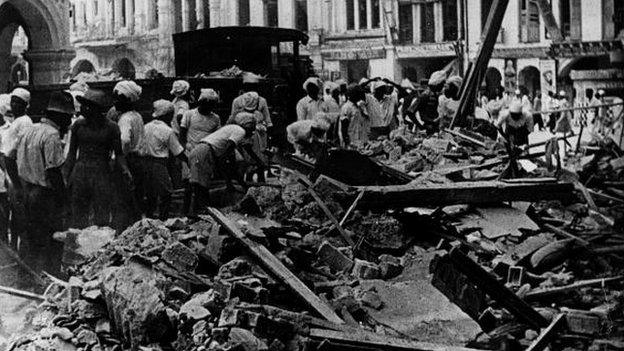
Singapore was heavily bombed by Japan during the Second World War
1826 - Singapore, Malacca and Penang become British colony of the Straits Settlements.
1832 - Singapore becomes capital of Straits Settlements. The port attracts thousands of migrants from China, India and other parts of Asia.
1867 - Straits Settlements become crown colony of British Empire.
1869 - Suez Canal opens, trade booms.
1922 - Singapore becomes main British naval base in East Asia.
1941 - World War II. Japan bombs Singapore.
1942 - Singapore falls to Japan, which renames it Syonan (Light of the South).
1945 - Japan defeated. Singapore under British military administration.
Independence
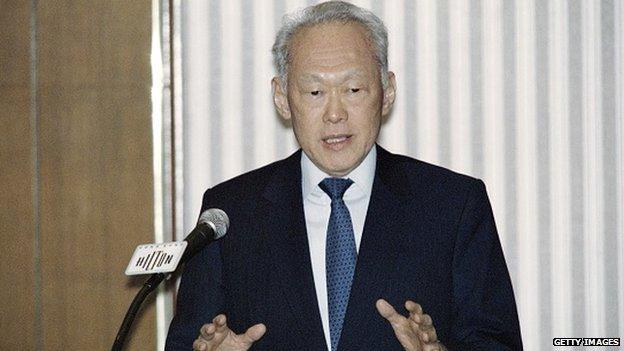
Lee Kuan Yew is seen as independent Singapore's founding father
1946 - Singapore becomes separate crown colony.
1959 - Self-government attained with Lee Kuan Yew as prime minister.
1963 - Singapore joins the Federation of Malaya, Sabah (North Borneo), and Sarawak in the Federation of Malaysia.
1965 - Singapore pulls out of the Federation of Malaysia, at Malaysia's invitation, amid political and ethnic tensions. The territory becomes an independent republic and joins the United Nations.
1967 - Singapore founder member of Association of Southeast Asian Nations (Asean).
1971 - Last British military forces withdrawn.
End of an era
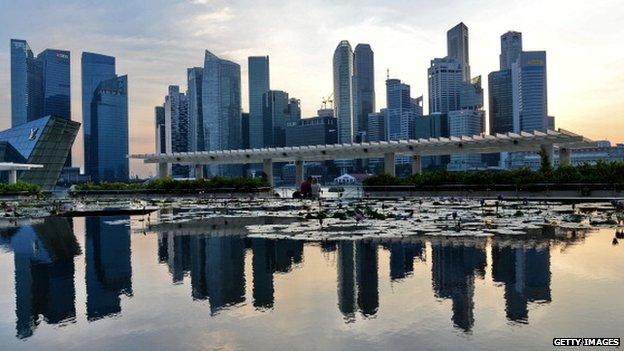
Singapore is one of the world's major financial centres
1984 - Two opposition MPs elected to parliament for first time.
1990 - Prime Minister Lee Kuan Yew stands down after 31 years, but continues to exert significant influence as senior minister. Goh Chok Tong becomes new prime minister.
1993 - Ong Teng Cheong becomes first directly-elected president.
1994 - Caning of American teenager Michael Fay for vandalising cars grabs world headlines.
1995 - Nick Leeson's disastrous dealings on Singapore stock exchange lead to collapse of Britain's oldest merchant bank, Barings. He is convicted in Singapore and sentenced to six and a half years in jail.
Asian crisis
1997 - Singaporean SilkAir airliner crashes into river in south Sumatra, with the loss of all 104 passengers and crew.
1998 - Singapore slips into recession for the first time in 13 years during Asian financial crisis.
Malaysia bans Singapore's military and rescue planes from its air space, after Lee Kuan Yew's memoirs accuse Malaysia of ''bullying'' during the 1960s.
1999 - S R Nathan becomes president without election after he is declared only candidate eligible to run.
Nick Leeson released early from Singapore jail for good behaviour.
2000 November - Singapore Airlines 747 airliner crashes while taking off in high winds at Taipei airport, killing 81 passengers and crew.
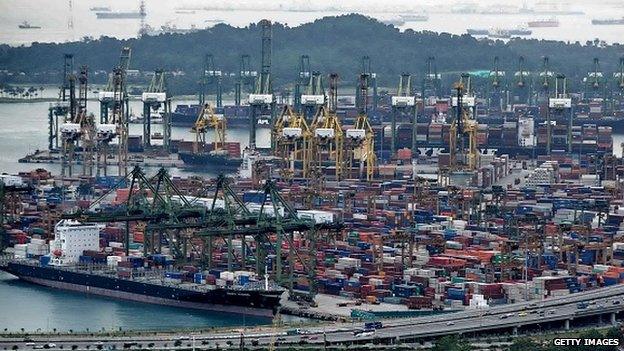
Singapore has one of the world's largest ports
2001 - Unprecedented anti-government rally - the first legal demonstration outside election campaign. Hundreds gather to support veteran opposition leader J.B. Jeyaretnam who faces bankruptcy and consequent expulsion from parliament. Malaysia, Singapore agree to end long-standing disputes, are to build a new bridge and tunnel. General election landslide victory for governing People's Action Party which secures all but two of the 84 seats.
2002 January - Japan, Singapore sign free trade agreement.
2003 - Outbreak of pneumonia-like Sars virus; Prime Minister Goh Chok Tong says outbreak is worst crisis country has faced. Singapore becomes first Asian nation to sign free-trade deal with US.
Power transfer
2004 August - Lee Hsien Loong, eldest son of former Prime Minister Lee Kuan Yew, is sworn in as prime minister.
2005 - Singapore, Malaysia settle a bitter dispute over land reclamation work in border waters. Government approves a controversial plan to legalise casino gambling, paving way for construction of two multi-billion dollar casino resorts. President S R Nathan begins second term after winning elections from which his rivals were disqualified. Execution of an Australian man for drug smuggling, despite high-level appeals for clemency, is condemned by Australia's attorney-general as barbaric.
2006 May - Lee Hsien Loong's ruling People's Action Party wins general elections which are seen as the first real test of the prime minister's popularity.
2007 January - Two African men are executed for drug smuggling despite worldwide appeals for clemency. Parliament votes against a proposal to decriminalise sex between men.
2008 February - Mas Selamat Kastari, suspected leader of Islamist militant group Jemaah Islamia, escapes from jail. Security forces mount massive manhunt.
Recovery
2009 - Singapore appears to emerge from its worst recession on record after the economy expands at an annualised rate of 20.4% between April and June.
2010 November - British author Alan Shadrake convicted for insulting Singapore's judiciary in a book on the death penalty.
2011 - Ruling People's Action Party (PAP) wins all but six seats in parliament, but opposition parties make unprecedented gains in what PM Lee Hsien Loong calls a "watershed election". Tony Tan is elected president, in the first election of its kind for 18 years.
2012 January - Government-appointed committee recommends massive pay cuts for ministers including prime minister and president.
2012 May - Opposition Workers' Party wins closely fought by-election, retaining seat left empty after MP expelled by the party in February.
2012 November - Singapore experiences its first strike since the 1980s. Chinese bus drivers walk out complaining their pay is lower than local or Malaysian drivers.
2013 May - Demonstrators hold an unusually large rally to protest against government plans to boost the population, mostly with foreign workers.
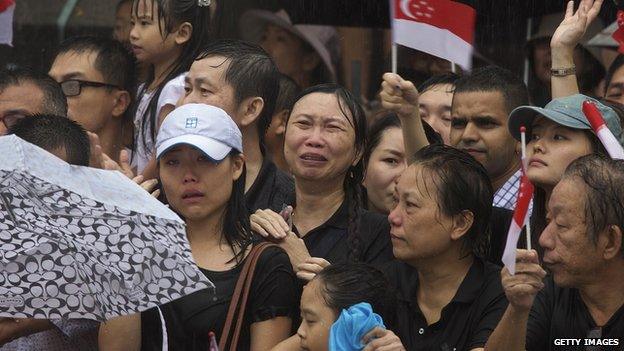
Tens of thousands lined the streets of founder Lee Kuan Yew's funeral procession in 2015
2013 December - A riot involving some 400 foreign workers breaks out following the death of an Indian migrant worker knocked down by a bus. It is the first rioting in Singapore in more than 30 years.
2014 March - Singapore becomes the second country in the world after the US to regulate virtual currencies such as bitcoins, in an attempt to prevent money-laundering.
2015 January - Prime Minister Lee Hsien Loong unveils stiffer measures against corruption after a number of high-profile graft scandals in the last two years.
2015 March - Singapore's founding father, Lee Kuan Yew, dies aged 91. Tens of thousands of people line the streets to attend his funeral procession.
2015 August - Singapore marks 50th anniversary of independence from Malaysia.
2015 September - The governing People's Action Party wins a snap election to extend its 50-year-old hold on power.
A Singapore court sentences a Filipino nurse to four months in prison for posting inflammatory comments about the city state on Facebook.
2015 November - The government reduces the number of banned publications from that 250 to just 17 to reflect "changes in society".
2015 December - The United States says it is deploying specialised maritime surveillance plane to Singapore in an apparent response to China's pursuit of territorial claims in the South China Sea.
2016 May - Singapore and Bangladesh arrest a group of Bangladeshi men suspected of being hardline Islamic militants. Singapore said it had detained eight men who were planning to overthow the Bangladesh government and establish a hardline regime aligned with so-called Islamic State.
Singapore says it will spend more than 1.5 billion dollars expanding the capacity of its military training bases in Australia as part of a 25-year agreement.
2016 August - Parliament approves a new contempt law which could see offenders jailed for up to three years. Human Rights Watch says the law could further impede freedom of speech and lead the media to self-censor.
The world's first driverless taxi service is launched in Singapore.
2017 March - A teenage blogger is granted asylum in the US. A judge said Amos Yee had been persecuted for his political opinions.
2017 July - Prime Minister Lee Hsien Loong and his siblings engage in a public row over the will of their late father, former prime minister Lee Kuan Yew.
2017 September - Hundreds of people protest against the uncontested Halimah Yacob being declared president, saying the move was undemocratic.